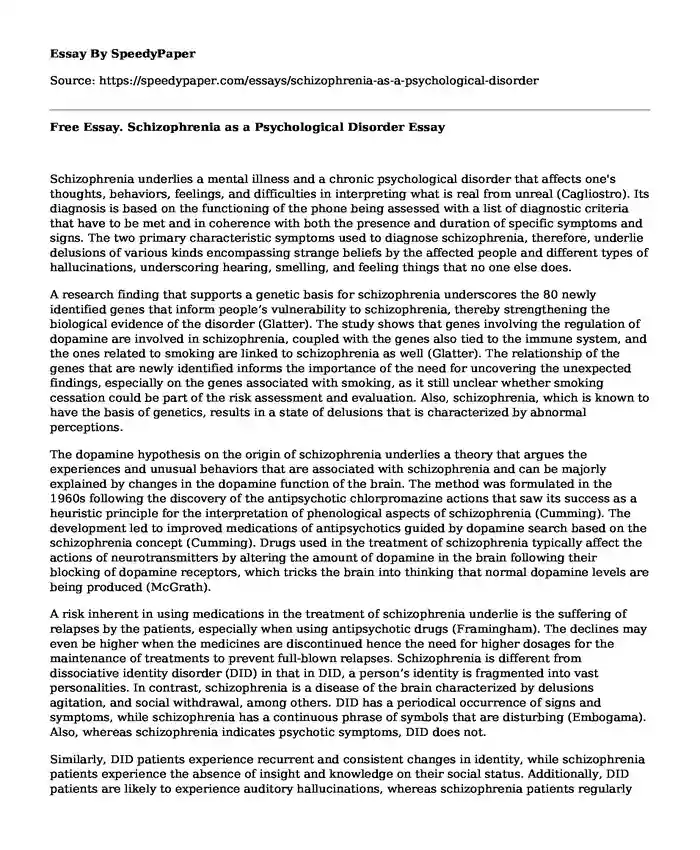
| Essay type: | Definition essays |
| Categories: | Medicine Intelligence Mental health Psychological disorder |
| Pages: | 3 |
| Wordcount: | 615 words |
Schizophrenia underlies a mental illness and a chronic psychological disorder that affects one's thoughts, behaviors, feelings, and difficulties in interpreting what is real from unreal (Cagliostro). Its diagnosis is based on the functioning of the phone being assessed with a list of diagnostic criteria that have to be met and in coherence with both the presence and duration of specific symptoms and signs. The two primary characteristic symptoms used to diagnose schizophrenia, therefore, underlie delusions of various kinds encompassing strange beliefs by the affected people and different types of hallucinations, underscoring hearing, smelling, and feeling things that no one else does.
A research finding that supports a genetic basis for schizophrenia underscores the 80 newly identified genes that inform people’s vulnerability to schizophrenia, thereby strengthening the biological evidence of the disorder (Glatter). The study shows that genes involving the regulation of dopamine are involved in schizophrenia, coupled with the genes also tied to the immune system, and the ones related to smoking are linked to schizophrenia as well (Glatter). The relationship of the genes that are newly identified informs the importance of the need for uncovering the unexpected findings, especially on the genes associated with smoking, as it still unclear whether smoking cessation could be part of the risk assessment and evaluation. Also, schizophrenia, which is known to have the basis of genetics, results in a state of delusions that is characterized by abnormal perceptions.
The dopamine hypothesis on the origin of schizophrenia underlies a theory that argues the experiences and unusual behaviors that are associated with schizophrenia and can be majorly explained by changes in the dopamine function of the brain. The method was formulated in the 1960s following the discovery of the antipsychotic chlorpromazine actions that saw its success as a heuristic principle for the interpretation of phenological aspects of schizophrenia (Cumming). The development led to improved medications of antipsychotics guided by dopamine search based on the schizophrenia concept (Cumming). Drugs used in the treatment of schizophrenia typically affect the actions of neurotransmitters by altering the amount of dopamine in the brain following their blocking of dopamine receptors, which tricks the brain into thinking that normal dopamine levels are being produced (McGrath).
A risk inherent in using medications in the treatment of schizophrenia underlie is the suffering of relapses by the patients, especially when using antipsychotic drugs (Framingham). The declines may even be higher when the medicines are discontinued hence the need for higher dosages for the maintenance of treatments to prevent full-blown relapses. Schizophrenia is different from dissociative identity disorder (DID) in that in DID, a person’s identity is fragmented into vast personalities. In contrast, schizophrenia is a disease of the brain characterized by delusions agitation, and social withdrawal, among others. DID has a periodical occurrence of signs and symptoms, while schizophrenia has a continuous phrase of symbols that are disturbing (Embogama). Also, whereas schizophrenia indicates psychotic symptoms, DID does not.
Similarly, DID patients experience recurrent and consistent changes in identity, while schizophrenia patients experience the absence of insight and knowledge on their social status. Additionally, DID patients are likely to experience auditory hallucinations, whereas schizophrenia patients regularly experience visual hallucinations (Embogama). Finally, DID patients have recurrent and persistent dissociative symptoms that may range from moderate to severe. While schizophrenia patients have isolated symptoms encompassed ng bizarre delusions and psychotic symptoms
Works Cited
Cagliostro, Dina. “Schizophrenia Symptoms and Diagnosis.” Psychom,2020,https://www.psycom.net/schizophrenia-symptoms-diagnosis
Cumming, Grunder. “The Dopamine Hypothesis of Schizophrenia; The Neurobiology of Schizophrenia, Science Direct,2016,https://www.sciencedirect.com/topics/neuroscience/dopamine-hypothesis-of-schizophrenia
Glatter, Robert. “Stronger Genetic Basis for Schizophrenia, Landmark Study Finds.”Forbes, Jul. 2014, https://www.forbes.com/sites/robertglatter/2014/07/25/stronger-geneticbasis-for-schizophrenia-landmark-study-finds/#39568e0763f4
Embogama "Difference Between DID and Schizophrenia." Pediaa, Aug.2016,https://pediaa.com/difference-between-did-and-schizophrenia/
Framingham, Jane. “Schizophrenia: The Challenges of Taking Medication.” PsychCentral, Jun.2020, https://psychcentral.com/lib/schizophrenia-the-challenges-of-takingmedication/
McGrath, Jane. “How Schizophrenia Works: Schizophrenia Treatment.” How Staff WorksApr.2008, https://science.howstuffworks.com/life/inside-the-mind/humanbrain/schizophrenia4.htm
Cite this page
Free Essay. Schizophrenia as a Psychological Disorder. (2023, Aug 21). Retrieved from https://speedypaper.net/essays/schizophrenia-as-a-psychological-disorder
Request Removal
If you are the original author of this essay and no longer wish to have it published on the SpeedyPaper website, please click below to request its removal:
- Essay Example on Bob Dylan's Definition of Success
- Research Proposal Paper Sample: Assault in Hospital Setting
- Risks of CVD in South Africa. Free Essay Example
- Free Essay Example. Endometrial Cancer
- Essay Sample on Group Poster Reflection Sheet
- Essay Sample on Why Mathematics Appeals to My Composed and Explicit Personality
- Optimizing My Day: A Personal Journey Through Time Management Strategies - Essay Sample
Popular categories




